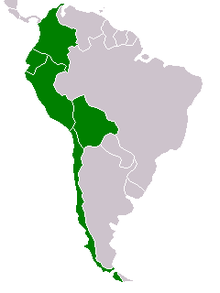Andean Parliament
It was created on 25 October 1979, in La Paz, Bolivia, through the Constitutive Treaty signed by the chancellors of the five member states, including Venezuela at the time.
The main functions of the Andean Parliament include legislative harmonization in its member countries, permanent and active representation of the peoples of the region, guaranteeing their participation and strengthening of the integration process, and parliamentary management through the political control of institutions of the Andean Integration System (SAI).
With the Cartagena Agreement, signed on May 26, 1969, the five countries met In what was originally called the Andean Pact, when its legal norms and provisions were established.2 Its objective was to strengthen its economies through free trade, tariff elimination and the customs union.
Subsequently, in 1996, through the Trujillo Protocol modifying the Cartagena Agreement, the governments of the subregion granted it supranational powers, defining it as the Political Control Unit of the Andean Integration System (SAI).
The reason given was the signing by Colombia and Peru of free trade agreements with the United States that distorted the CAN, according to the Venezuelan government.
Together with academics of the body and teams of parliamentarians, the analysis of international treaties, constitutions and national laws, development plans drawn up by governments, is carried out as a comparative exercise.
Inclusive Fairs include the exhibition of handicrafts, natural products and entrepreneurship of the cultures of each Andean country, with the purpose of including vulnerable populations such as mothers head of household, people reinserted into civil society, displaced by conflict, people with disabilities, Among others, in the support of our organism to its work.
These initiatives allow strategic alliances with Andean citizens for the development of community awareness and socio-cultural identity through art.
In the same way, it has been working on projects with organizations such as: In addition, Andean parliamentarians have spearheaded the international spreading of crucial issues for the region, in integration forums such as the Euro-Latin American Parliamentary Assembly (EuroLat) and the Inter-Parliamentary Union (IPU).
According to the Constitutive Treaty, in case direct elections are not held by a country, the five members will be selected by the national legislature, according to their own protocols.

